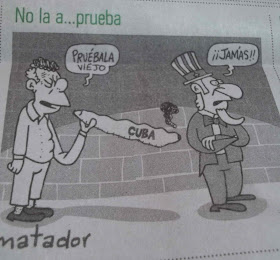 |
| Seized marijuana being burned by Mexican authorities. Will prohibitionist laws go up in smoke too one day? |
El Tiempo newspaper, which has long advocated decriminalizing drugs as a way to reduce their damage, celebrates with a headline today that a U.S. official agreed to discuss decrminalization at the summit - but made plain that Washington's idea of 'discussion' is to repeat that it opposes any changes.
 |
| This stuff didn't get burned. Pot being sold in a California 'medical marijuana' dispensary. (Photo: http://www.theweedblog.com/) |
If Washington has anything to say about it - and it will thru its massive influence thru trade, aid and military financing - then no policy changes will come out of Cartagena. After all, this is an election year in the U.S., and prohibitionist policy's greatest coup was getting the 'War on Drugs' label. No U.S. politician wants to admit defeat in a 'war' - even one that's been so patently disastrous. If only, instead of the war terminology, Richard Nixon had called on Americans to rally behind a 'Chemical dependency management strategy', changing course today would be lots easier.
 |
| At least 22 U.S. states have either decriminalized pot or legalized medical marijuana. |
Robertson drinks wine, and he argued that marijuana, which is much less addictive, should be regulated like alcohol.
For his part, Colombian Pres. Juan Manuel Santos said that "if there is a nation which has suffered the damage of narcotrafficking, it's been Colombia."
The absurdity of the U.S.'s marijuana laws is clear. Marijuana has been de facto legalized in at least 22 U.S. states thru either 'medical marijuana' or marijuana decriminalization laws. Yet, drug warriors continue seizing and destroying pot at the U.S.-Mexican border. The inevitable result: the people producing marijuana and moving it into the U.S. are not tax-paying agro companies, but violent cartels, who have made Mexico and Central America into a battlefield.
All that over a product which is sold legally in many U.S. cities, and helps people to mellow out.
 |
| A California marijuana field. (Photo: http://www.thedailychronic.net) |
Of course, those drug cartels also traffic cocaine, methanphetamines and other damaging, mind-altering substances. The cost-benefit of legalizing those drugs is different, but I believe that decriminalization is worth trying there, too, if only to take the profits away from the cartels and because the drugs are getting thru, anyway.
Don't expect any breakthroughs in Cartagena, especially in a U.S. election year, when any hint of flexibility by the Obama administration would have the Republicans accusing Pres. Obama of wanting to turn American kids into junkies.
 |
| 'Try it' 'Never!' A cartoon in El Tiempo newspaper ridicules Uncle Sam's refusal to consider drug decriminalization by associating it with the U.S.'s refusal to deal with Cuba. |
Addendum: Cuba evidently will not attend the summit because it is not a democracy. And if Venezuela's bombastic Pres. Hugo Chavez does attend, he'll likely be feeling weak because of his battle with cancer.
With one of the U.S.'s loudest critics absent and another quieted, that'll make it tougher to dismiss criticism of the drug war as simply more than gringo-bashing.
By Mike Ceaser, of Bogotá Bike Tours
No comments:
Post a Comment